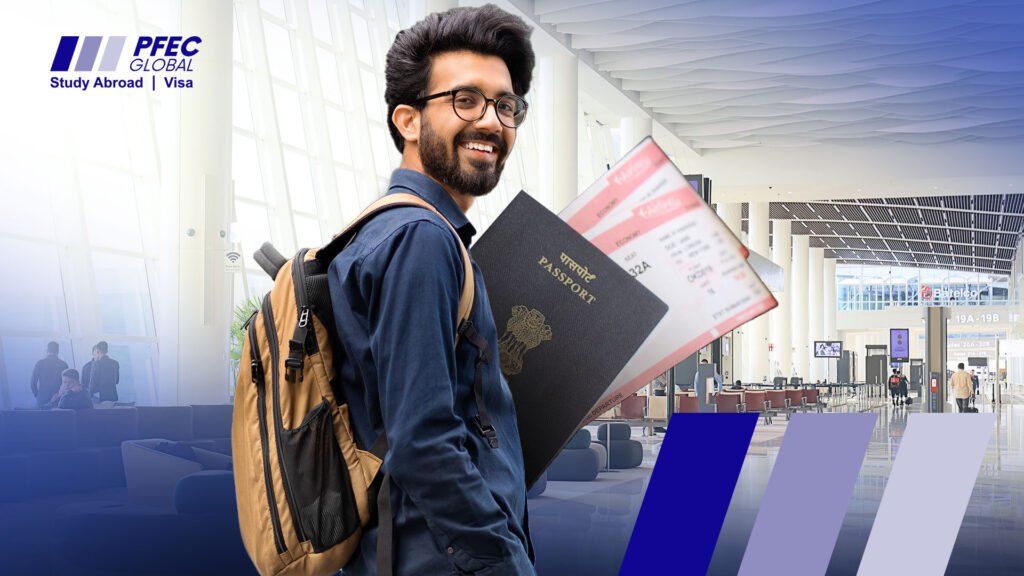How International Education Elevates Personal Growth for Indian Students
- Priyanka Chandwani
- 8 min Read
Studying abroad empowers Indian students to grow into confident, independent, and globally aware individuals. It nurtures life skills like adaptability, emotional resilience, and cultural intelligence—essential for both personal transformation and career success. From managing daily responsibilities to overcoming homesickness and embracing diversity, international education fosters self-reliance and maturity. With meaningful experiences and expert guidance from PFEC Global, Indian students can unlock not only academic opportunities but also a lifelong foundation for leadership and personal growth.

Studying abroad is not only about earning a degree or attending a famous university. It is about the transformation you experience during the journey.
When Indian students move to a new country, they leave behind familiar comforts. They step into a world where they must adapt, learn, and grow quickly.
International education elevates personal growth for Indian students by offering real-world exposure that traditional classrooms often cannot provide.
From understanding different values to managing daily life independently, studying abroad builds maturity and a stronger mindset. Many students return with sharper decision-making skills, deeper empathy, and the confidence to thrive in any situation.
For parents, it is a proud moment when they see their child become a self-reliant adult.
Building Confidence Through Cultural Adaptability
Adjusting to a new country involves much more than handling jet lag. It requires learning new norms, systems, and ways of communication.
Indian students often begin by solving everyday challenges such as:
- Navigating from the airport to their university
- Setting up bank accounts and health insurance
- Understanding public transport and local grocery systems
- Speaking and adapting to different accents
- Adjusting to teaching styles based on discussion and critical analysis
Each small task builds real-world confidence over time.
How Cultural Adaptability Boosts Growth
- Solving problems independently, from handling university paperwork to dealing with landlords
- Learning to listen across cultures, an important skill in global workplaces
- Handling setbacks like visa delays, academic challenges, and part-time job difficulties
- Standing up for themselves when facing bias or communication issues
Expert Tip: Students who interact with locals and work part-time adjust faster. They build cultural fluency, resilience, and lasting self-confidence.
As Indian students master these experiences, they shift from asking “Can I do this?” to declaring “I have handled tougher challenges.”
This transformation explains why international education elevates personal growth for Indian students.
Developing a Global Perspective on Identity and Beliefs
Living abroad means sharing space with people who think, speak, and live differently.
For many Indian students, it is the first time they step outside the familiar cultural bubble of family, school, and society.
Through multicultural classrooms, shared housing, and diverse workplaces, students learn to:
- Reflect on their values and upbringing
- Understand other belief systems without judgment
- Question social assumptions, including caste, gender, and roles
- Participate in open discussions about race, religion, and identity
This process does not erase their Indian identity. It strengthens it.
Personal Growth Outcomes
- Students stand by their roots with more confidence
- They respect other viewpoints while holding onto their own
- They learn to balance tradition with personal evolution
Expert Tip: Joining cultural societies or international events can deepen this learning. It helps students see the world through multiple lenses while understanding themselves better.
Overcoming Challenges: Homesickness, Culture Shock, and Mental Health
The first few months abroad can feel overwhelming. New food, unfamiliar beds, and no familiar faces can cause emotional strain.
Many Indian students quietly face challenges such as:
- Homesickness during festivals and family events
- Social anxiety when joining new groups
- Feeling out of place because of language, accent, or appearance
- Academic pressure in fast-paced education systems
Facing these emotions, rather than avoiding them, builds true resilience.
Ways Students Grow Through This Phase
- Reaching out to campus mental health support, which is free and stigma-free
- Building routines, like cooking Indian meals or joining student communities
- Talking openly with peers facing similar struggles
- Recognising emotional patterns and developing coping strategies
Expert Tip: Parents should stay in touch but allow students space. Balanced communication helps students settle and grow faster.
Working through emotional discomfort teaches students to:
- Identify their emotional triggers
- Build coping skills that last a lifetime
- Grow into more independent, calm, and self-aware individuals
This is where the benefits and challenges of international education become deeply personal. The emotional struggle becomes part of the personal transformation.
Building Independence and Life Skills Abroad
The moment an Indian student arrives abroad, everyday survival turns into a crash course in adulthood.
Tasks once handled by parents or domestic staff now become the student’s responsibility.
Key Skills Students Develop
- Budgeting rent, groceries, and mobile bills in a foreign currency
- Cooking basic meals and managing nutrition
- Using public transport, doing laundry, and planning schedules
- Balancing part-time work with academic commitments
These tasks teach real-world independence.
How Students Grow
- Prioritising spending when ₹100 equals only about $1.20
- Planning meals and reducing unnecessary expenses
- Managing deadlines without reminders
- Handling health appointments, accommodation issues, and formal paperwork independently
Expert Tip: Students who track their expenses from the first month avoid financial stress and build strong money management skills.
Career Benefits of Personal Growth During Study Abroad
Personal growth abroad builds much more than character. It directly strengthens your career potential.
Global employers today value more than academic records. They want graduates who can:
- Solve problems independently without constant supervision
- Adapt quickly to change and new environments
- Communicate clearly across teams and cultures
- Handle pressure with calmness and confidence
Indian students who study abroad bring all these strengths to the workplace.
They already have experience with:
- Living independently in unfamiliar systems
- Managing academics while working part-time
- Navigating cultural differences professionally
- Balancing study, work, and family expectations across time zones
These experiences shape maturity that employers recognize immediately during interviews.
Students who study abroad do not just meet job expectations. They show a global mindset, flexibility, and leadership qualities that shape the future workforce.
Expert Insight: Why international education elevates personal growth matters is simple. It transforms students into confident, globally ready professionals.
The Dual Reality: Benefits and Challenges of Personal Growth Abroad
Studying abroad brings excitement and opportunity, but also real challenges. Growth rarely happens in comfort. It happens when students overcome struggles and adapt.
Benefits of Personal Growth Abroad
- A broader worldview by meeting diverse classmates and teachers
- Practical life skills like budgeting, cooking, and self-management
- Greater emotional strength and independence
- Career-ready soft skills such as problem-solving, adaptability, and teamwork
Challenges of Personal Growth Abroad
- Loneliness during festivals or special occasions
- Culture shock and the need to adjust to different academic styles
- Financial stress due to limited part-time job opportunities
- Emotional exhaustion from handling studies, work, and life alone
Expert Tip: True growth often happens after setbacks. Encourage students to reflect on challenges instead of retreating from them.
Facing and overcoming these challenges teaches Indian students critical life skills. They learn to manage uncertainty, work with diverse people, and lead with empathy.
The hard moments are not failures. They are important steps in the journey of transformation that international education brings.
Why Personal Growth Should Be a Key Factor in Study Abroad Planning
Many Indian families begin planning with questions about course ROI, visa chances, or PR pathways. These are important. But equally important is understanding who the student becomes during the journey.
Why international education elevates personal growth matters is simple. The inner transformation lasts longer than any job title or salary.
Students who study abroad return with:
- Confidence to live and work independently anywhere in the world
- Emotional maturity to face personal and professional challenges
- A mindset that values learning, collaboration, and global thinking
These traits create lifelong advantages across careers, relationships, and personal leadership.
This journey is not only about academics. It is about how the student evolves as a person.
Encourage students to reflect with these key questions:
- Will this experience help me grow personally and professionally?
- Am I ready to be challenged and step out of my comfort zone?
- What kind of person do I want to become through this journey?
Conclusion
Studying abroad changes much more than a resume. It transforms who you are.
International education is not only about earning a degree. It is about discovering your ability to adapt, speak up, solve problems, and stay resilient in new environments.
For Indian students, personal growth often happens in small moments. It comes from managing homesickness during Diwali, speaking up in an unfamiliar classroom, or handling daily life in a new country with no familiar safety nets.
These real-world lessons shape the individual you become. They last far beyond graduation day. When you plan your study abroad journey, do not focus only on university rankings or return on investment. Think about the human being you will grow into during this process.
That growth will be your greatest achievement.
FAQs
How does international education impact personal growth for Indian students?
It builds independence, emotional strength, and global thinking — skills often underdeveloped in India’s traditional education systems.
What emotional challenges do Indian students face while studying abroad?
Students often experience homesickness, culture shock, loneliness, and the pressure to succeed while managing life independently for the first time.
Why is cultural exposure important for personal development?
Cultural exposure challenges personal assumptions, develops empathy, and strengthens the ability to work with diverse people — an essential skill today.
How can Indian students prepare for the personal side of studying abroad?
Start early by cooking basic meals, managing a personal budget, understanding emotional wellness, and learning about the destination country’s culture.
What soft skills do Indian students gain from international education?
They develop adaptability, clear communication, confidence, time management, emotional intelligence, and cultural sensitivity

Take your Study Abroad Dreams to the Next Level
Receive free end-to-end assistance and personalized guidance from experts
Get Started for FREE →

